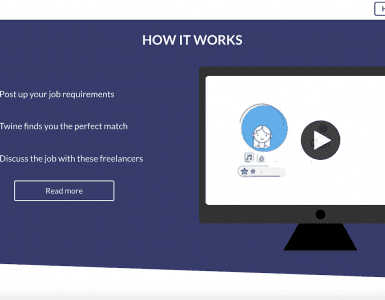So, you’re managing a project and it becomes clear that your freelancer hasn’t understood the brief. You’ve received work from them and it’s just not what you expected. Way off the brief, and not what you asked for at all.
This is a disappointing situation that’s quite common amongst new clients and freelancers. What’s even more frustrating is that this situation is actually very easy to avoid. But, once you’re at the stage where you’ve been sent completed work by the freelancer, there’s not much you can do about it
We’re not talking about poor or bad work here. Rather, we’re addressing work that does not match the aims set out by the original project brief. In short, your freelancer hasn’t understood your brief.


First things first, deal with the situation:
Tell your freelancer what the problem is and why the work isn’t what you expected. It goes without saying, be calm and professional when you do this. Hopefully, you’ll only be part way through your project, and it won’t be too late to change direction. You and your freelancer can discuss what went wrong and get the project back on course.
Don’t panic – go to plan B:
Your freelancer will have a plan for this type of situation. If the freelancer hasn’t understood the brief and you’re not happy with their work, your freelancer will most probably offer to revise the work for you.


Should you still pay them?
Yes. In the situation where the freelancer hasn’t understood the brief, both parties are at fault. So, you should pay the freelancer for the work they have done. When a freelancer hasn’t understood the brief, this is the fault of the freelancer for not asking the right questions, and the fault of the client for not writing a clear enough brief.
Whether or not you keep the same freelancer to finish/re-do the project is another matter. If you feel after further discussion and a revision of the brief that they understand the project and its aims, there’s no reason to ditch them. If they still can’t grasp what you want, then perhaps you should think about finding someone else.
Why did this happen?
There are multiple reasons as why a freelancer might not understand your brief.
-
The brief wasn’t clear enough:
This is almost always a factor when you receive work that doesn’t meet your project brief. It’s the number one most important thing when working with freelancers – make sure you write a clear project brief. If your brief is in any way vague or too short, your freelancer will not have all the information they need to complete your project, and this won’t be their fault.
-
Did you explain the brief?
Even if you’ve written the best brief in the world, make sure your freelancer understands it. Don’t just hand it over and expect the freelancer will automatically be able to interpret it and know exactly what you want. Explain the brief, and make sure your freelancer is on the same page as you.
-
Is it a language thing?
If your freelancer is international, do they speak the same language as you? If not, this could be an extra stumbling block preventing your freelancer from understanding your brief properly. Speak to them and make sure they understand exactly what you want.


How do I avoid this problem?
Don’t despair, this problem is actually very easy to avoid. If you follow these steps, you’ll never receive work that’s off brief from your freelancer again.
-
Write a clear and easy to understand brief.
This will set you off on the right path. Don’t use complicated language or terminology that’s specific to your company, otherwise they might not understand it. Our article on how to write a good project brief will explain how to write A* briefs every time.


-
Touch the brief, feel the brief, BE THE BRIEF:
Don’t just ask your freelancer to read the brief, ask them to understand it. If you can, read through it with them. Answer all their questions, talk them through any concerns they have, and make sure they Understand. Every. Word. If it’s relevant, show visual examples of the type of thing you want. The more information you can give, the better. Get them to explain the project back to you, and then you’ll be able to see if you’re both singing from the same hymn sheet.
-
Communicate your thoughts:
Freelancers aren’t mind readers. New clients can often neglect to give their freelancers a lot of the small details about their project. Clients sometimes think that those details will be obvious to a professional, so it’s best not to bother them with more instructions. This is not the case. Don’t assume your freelancer will know what to do. Tell them.


-
Check in regularly:
If your freelancer starts to go off brief, you need to catch this early and steer them back in the right direction. The best way to do this is to check in with your freelancer regularly. Schedule regular feedback sessions where your freelancer can show you how it’s going so far.
-
Understand their process:
Get your freelancer to explain their process. This will keep you informed and let you know what’s going on.
-
Listen to their advice:
It could be that your freelancer made some professional judgement calls when it came to your project, which meant that it turned out a little different than you expected. Whilst your freelancer shouldn’t do this without your consent, listen to their advice. They are professionals. If they’re pleading with you not to add audio to your blog, there could be something in it.


-
Make sure you’re available:
If your freelancer has a question or problem, make sure you’re available to give them the answer. Give them more than one way to get in touch with you. If you’re going to be away, leave alternate contact details for a team member who can help in your absence.
-
Be approachable:
It seems straightforward. If your freelancer has a question then they should just ask you, right? But, are you sure your freelancer feels comfortable about approaching you? Make sure you haven’t created barriers and distance between you and your freelancer, however subconsciously this might have been. Be careful with your choice of language. If you say things like “I only check my emails at 5.30 every day”, to them this means you’re unavailable the rest of the time. “I’m super busy and I have another team to manage as well as you” could come across as “I will be too busy to answer your questions.” If you’re genuinely busy, make sure your freelancer understands the brief and project objectives from the outset.
-
Don’t give huge projects to new freelancers:
If you’re working with somebody for the first time, don’t give them a huge project for their first assignment. To test whether or not they can work to your brief and deliver work that you like, try giving them a smaller project first. Then, if it works out you can think about hiring them for your larger projects.


-
Hire a professional:
Make sure you’ve hired a professional who can do what they say they can. Lots of first time clients are lured in by very cheap freelancers who offer astronomically low prices. It’s very tempting, but you’ve got to ask yourself why are they so cheap? In general, you get what you pay for.
Need some tips on writing the perfect project brief? We’ve got plenty of examples for you to check out:



